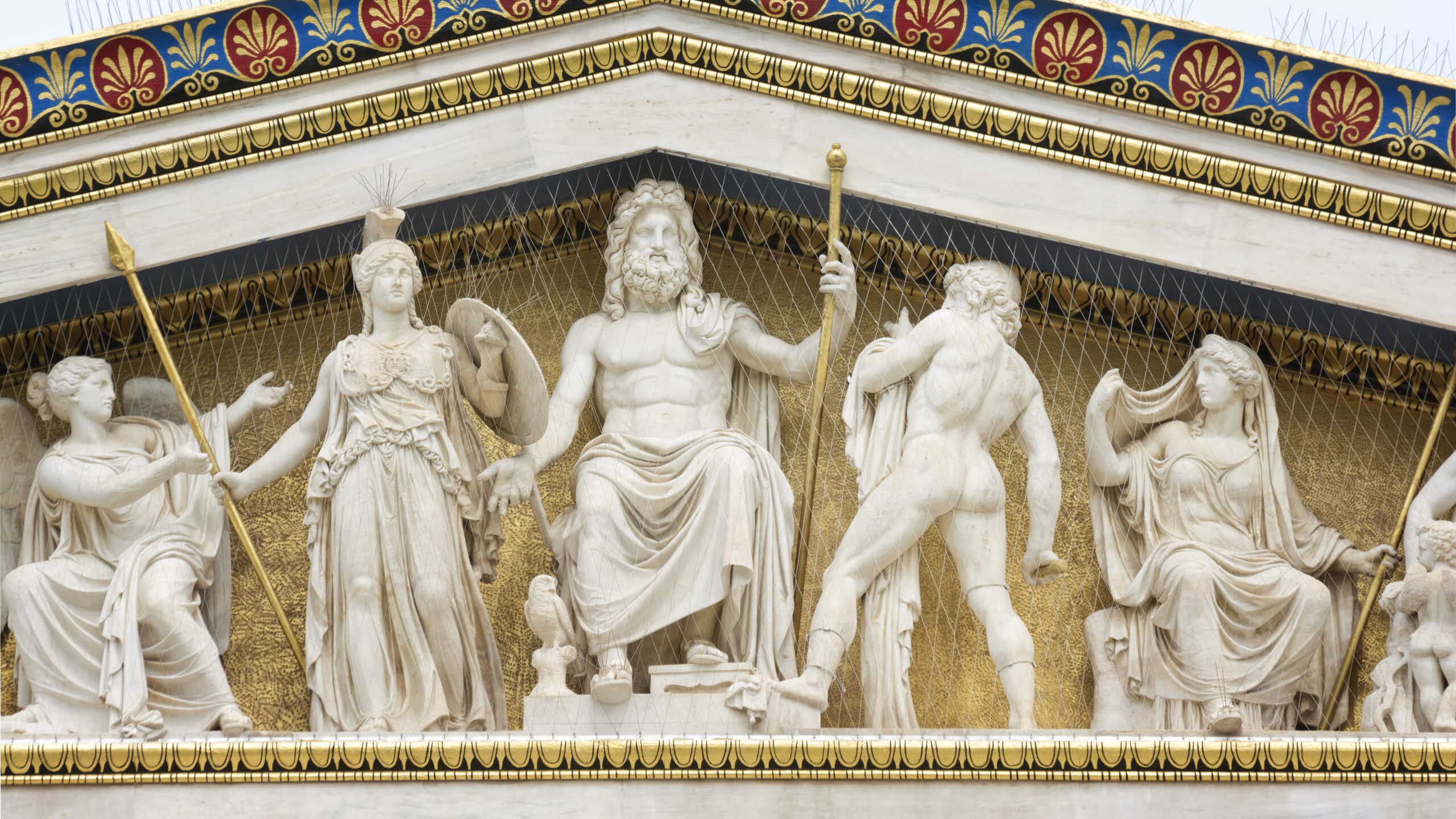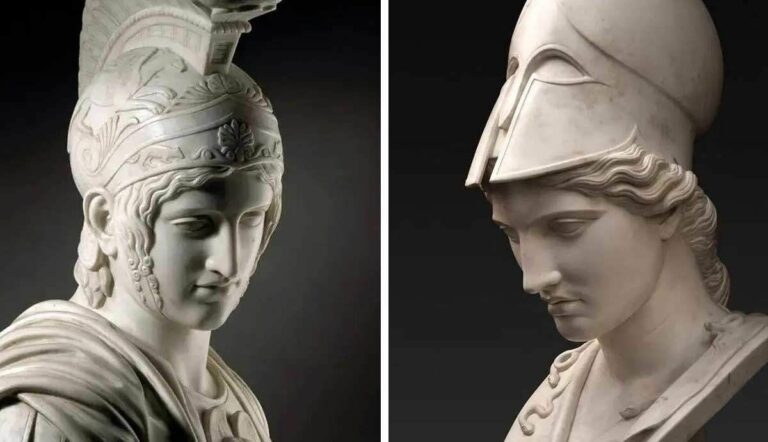Meaning
Roman Goddess of Wisdom and Warfare
Minerva, the Roman goddess of wisdom, warfare, arts, crafts, and strategic battle, derives her name from the Etruscan deity Menrva. Her counterpart in Greek mythology is Athena, both representing powerful female figures with intellectual prowess and military might.
The Romans adopted Menrva into their pantheon during the 7th century BCE, incorporating her attributes and stories into their own mythology. Her name evolved from Menrva to Minerva, reflecting the Roman pronunciation and assimilation of Etruscan influences.
Minerva’s association with wisdom stemmed from her role as a protector of cities and knowledge. She was believed to bestow strategic intelligence upon warriors and artisans, inspiring inventions, crafts, and architectural feats. Her temple in Rome, built on the Capitoline Hill, served as a center for religious worship, intellectual discourse, and civic gatherings.
As the goddess of warfare, Minerva embodied discipline, strategy, and courage. She was invoked before battles for guidance and victory, often depicted wielding a spear, shield, and helmet, representing her military prowess. However, she favored just and righteous warfare, advocating for strategic planning and minimizing unnecessary bloodshed.
The name Minerva continues to resonate today, evoking images of intelligence, skillfulness, and strength. Her enduring legacy reflects the Roman values of intellect, craftsmanship, and strategic leadership.

Symbolism of Owls, Olives, and Spears
Owls hold a rich tapestry of symbolism across cultures and throughout history. Often associated with wisdom and knowledge due to their nocturnal habits and sharp intellect, owls have been revered as symbols of divine insight and spiritual guidance.
In ancient Greece, owls were sacred to Athena, the goddess of wisdom, warfare, and crafts. Their association with her further cemented their symbolic connection to intelligence and strategic thinking.
Olives represent peace, victory, and abundance. Their symbolism stems from ancient mythology. In Greek mythology, the olive tree was sacred to Athena who gifted it to the city of Athens as a symbol of peace and prosperity after defeating Poseidon for patronage.
Olive branches are frequently used as symbols of peace treaties and reconciliation. Their image evokes a sense of tranquility and harmony.
Spears, on the other hand, symbolize power, protection, and authority. They are often associated with warriors and military leaders, representing their strength and ability to defend themselves or others.
The spear’s pointed end signifies its offensive capabilities, while its shaft embodies a sense of steadfastness and resilience.
Origin
Greek Predecessor: Athena
Minerva is a Roman goddess, her name deriving from the Latin word *minervā* which means “mindful” or “remembrance”.
Her attributes and stories strongly reflect her Greek predecessor, Athena.
- Both goddesses are associated with wisdom, intelligence, handicraft, warfare, and strategy. They embody the virtues of a civilized society: intellect, defense, and justice.
- Athena emerged fully grown from Zeus’s head, symbolizing divine knowledge and strategic brilliance. Minerva is also born “fully armed” in Roman mythology, signifying her readiness to defend Rome against its enemies.
- Both goddesses are patrons of cities and craftswomen. Athena protects Athens and encourages weaving, pottery, and other artistic endeavors. Minerva similarly protects Rome and is associated with various trades like metalworking and wool weaving.
- They are both depicted with characteristic weaponry: Athena with a spear and aegis (a shield adorned with the head of Medusa), Minerva with a spear, helmet, and sometimes a shield.
Despite their shared attributes and origins, there are subtle distinctions between Minerva and Athena. Athena is more directly linked to the artistic and cultural pursuits of ancient Greece. Minerva, on the other hand, was more closely associated with martial prowess and military strategy, reflecting the Roman emphasis on strength and conquest.
The name Minerva’s ultimate origin is likely Etruscan, *Menerva*, which may have been derived from a pre-Italic god of war.
Etruscan Influence
Minerva is a Roman goddess whose name derives from the Latin word *minerva*, meaning “mind” or “wisdom.”
Her origins are deeply intertwined with those of the Etruscan civilization.
The Etruscans, who dominated much of Italy before the rise of Rome, had their own goddess named *Menerva*, whom they associated with wisdom, warfare, and crafts.
When the Romans came into contact with the Etruscans, they adopted and adapted many of their cultural practices, including their deities.
The Etruscan *Menerva* was readily incorporated into Roman mythology as *Minerva*, reflecting the shared understanding of her attributes among both cultures.
However, the Romans added their own nuances to Minerva’s character, emphasizing her role as a protector of cities and a patron of strategic warfare. She became closely linked with the arts of weaving and metalwork, skills traditionally associated with female deities in Roman society.
- The Etruscan name *Menerva* is thought to have originated from a pre-Indo-European language spoken in ancient Italy.
- Linguistic scholars speculate that the root of the word may be related to words meaning “to think” or “to remember,” further reinforcing Minerva’s association with wisdom and intellect.
Thus, Minerva’s name and story provide a fascinating glimpse into the cultural exchange between the Etruscans and Romans, demonstrating how shared beliefs and practices could be transformed and reshaped over time.
History
Association with Roman State and Military
Minerva is the Roman equivalent of the Greek goddess Athena. Her name originates from the Latin verb “minervari,” meaning “to remember” or “to plan.” This connection reflects Minerva’s association with wisdom, strategy, warfare, and crafts.
Minerva was a major deity in the Roman pantheon, highly revered for her protective qualities over the city of Rome and its armies. Her temples were prominent landmarks throughout the Roman world, often serving as centers of civic life and religious observance.
The Romans considered Minerva a powerful force in warfare, bestowing wisdom and tactical skill upon their generals. She was believed to inspire courage and protect soldiers from harm. Images of Minerva in armor frequently adorned military standards and fortifications, symbolizing the divine support of Rome’s armies.
Minerva’s association with crafts stemmed from her patronage over artisans and weavers. She was credited with inventing various tools and techniques, including spinning, weaving, and metalworking. Roman artisans dedicated their work to Minerva, seeking her blessings for success and innovation.
Throughout Roman history, numerous festivals and rituals honored Minerva, reflecting the importance she held in society. The “Ludi Minervalia” was a festival dedicated to Minerva, celebrated annually with processions, sacrifices, and athletic competitions.
Religious Practices and Festivals Devoted to Minerva
Minerva, the Roman goddess of wisdom, crafts, and strategic warfare, holds a prominent place in Roman mythology and religious practices.
Her name, derived from the Etruscan goddess Menrva, is believed to have origins linked to the meaning “intellect” or “mind.” This association with intelligence and strategy deeply influenced her portrayal and the festivals dedicated to her.
The Romans identified Minerva as a protector of cities, artisans, and soldiers. Her temple in Rome, built on Capitoline Hill, served as a vital religious and political center.
Religious practices devoted to Minerva involved offerings, prayers, and rituals performed by both commoners and the elite. Her worship often intertwined with other deities like Jupiter and Juno, reflecting her multifaceted role in Roman society.
Here are some notable festivals dedicated to Minerva:
* **The Quinquatria:** This five-day festival celebrated Minerva’s patronage of artisans and took place annually in March. It involved processions, offerings of tools and weapons, and competitions among craftsmen.
* **Minerva’s Birthday:** Though no specific date is recorded, Romans celebrated Minerva’s birthday with grand festivities.
These festivals not only honored the goddess but also served as important social events, reinforcing Roman values of civic duty, craftsmanship, and military prowess.
- 30 Best B2B Leads Database Providers to Try in 2025 - April 26, 2025
- Best Clay Alternatives for 2025 - April 26, 2025
- Best Lusha Alternatives for 2025 - April 26, 2025

